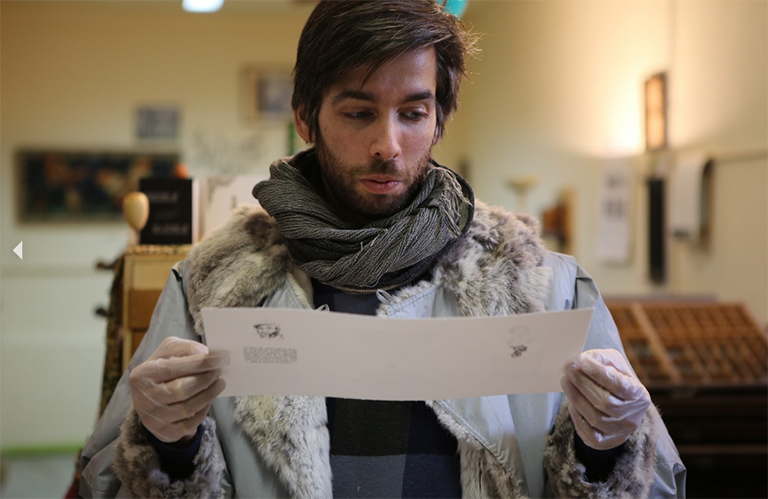Actor, Publisher Tucker Kapp (C'10) Returns for 10-Day Artistic Residency
October 29, 2018 — When Tucker Kapp (C’10) arrived at Georgetown, he was certain he wanted to be a diplomat, but the Hilltop had other plans for him. This month, he returned to his alma mater for an artistic residency with seven years of theater and teaching experience in France under his belt.
Kapp is guest lecturing three meetings of a contemporary French theater class during his 10-day residency. Tuesday, he’ll cap off his stay with the debut showing of S’Avoir, a one-man multimedia performance dealing with themes that Kapp has been working on since his undergraduate years.
A PASSION FOR LITERATURE
Kapp had originally enrolled in the Edmund A. Walsh School of Foreign Service, with eyes on a career working for the government abroad. His interest in literature, however, didn’t mesh with the extensive SFS core requirements.
“I had refused to take a required economics course, because I wanted to take this English class with Father Murphy, ‘The Germanic and Christian Hero,’” Kapp said. “It was a superb introduction to literature in a way I had never seen literature before.”
On the advice of SFS Dean Elizabeth Andretta, Kapp transferred to the College to further explore his interest in the humanities. He kept his international focus, majoring in French, but now had more space to try classes in literature and the arts.
“She saw who I was more than other teachers at the time, and she encouraged me to pursue what I really loved,” Kapp said.
ACTING, TEACHING, AND PUBLISHING
After graduation, Kapp moved to France with no real plan beyond a one-year teaching assistant program run through the French embassy. As the program drew to a close, he joined a theater company and spent the next several years as a part-time actor and part-time teacher.
“I was really just supposed to go for one year — just a short exchange program before getting a master’s degree or something,” Kapp said. “But I was hired by this company, stayed on, taught on the side to make a little extra money, and participated in some really cool shows.”
Kapp developed an interest in letterpress printing, the technology that Johannes Gutenberg used on the original printing press. In 2013, Kapp founded Les Écrits 9, a publishing house that uses only analog printing methods to print the work of relatively unknown authors and poets.
“It obviously takes a whole lot of time, but it’s actually cheaper if you’re willing to invest the time,” Kapp said. “We’re now on our seventh book, and we’ve been recognized by the French government as a real publishing house doing important work. We’re publishing contemporary poets who need to be published, even if they haven’t been published before.”
CONSTRUCTING IDENTITIES
Kapp returned to the Hilltop this fall to complete a 10-day artistic residency, during which he has lectured in three classes and will perform in an original one-man multimedia show, S’Avoir.
Performing has taken a backseat to publishing and teaching for Kapp in recent years — in addition to running Les Écrits 9, he’s now a professor of English and general culture at an aerospace engineering school. But S’Avoir, which critically examines the creation of identity through language, represents the culmination of years of thought dating back to his undergraduate days.
“We’ve constructed these statues, these identities of what humans can be, and that’s all based on language,” Kapp said. “For example, when we say ‘night,’ the word becomes this statue that connotes all these other things — danger, mystery, wolves — when we’re just trying to describe when the sun is down. I’m questioning the ability to define ourselves with words, as if we were fixed beings.”
Kapp credits his professors at Georgetown College with helping him develop intellectually, engage with complex ideas, and take risks to pursue his interests.
“The idea of the show started here,” Kapp said. “I had the most wonderful experience with the professors here. … At the most crucial moments in my life, my teachers were there for me with good advice.”
